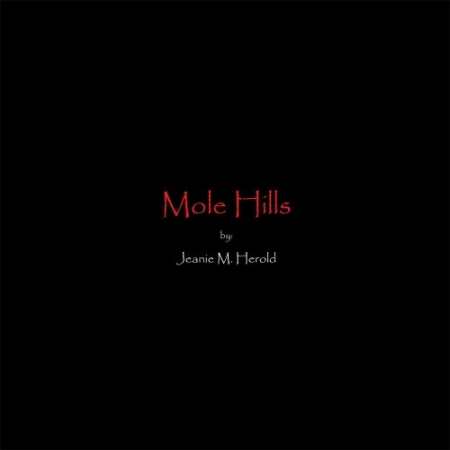
Mole Hills
A journey toward self-awareness relayed through poetry is accentuated by reflective photos.
Poems of personal transformation, complemented by photographs of the natural world, fill Mole Hills, a small volume of work by Jeanie M. Herold. The book represents Herold’s effort to understand and accept the death of her parents, explore the life around her, and define her spiritual beliefs. Neither a poet nor photographer before this period of self-study began, Herold’s combination of these art forms captures a singular spurt of creative output.
The contents of the poems include eulogies to Herold’s parents and comparisons of nature to human experience. Photographs of birds, animals, flowers, and water scenes appear on separate pages, some related to the poems and others not, many taken at close range. The photos vividly reflect the contemplative spirit of the poetry.
Several pages contain poems superimposed on photographs. “Dew Drop Reflection” depicts a tightly drawn rope to which evenly-spaced drops of water cling. The poet notices reflected images in the water drops and wonders if, similarly, a person’s being is reflected in another’s heart. In “Delicate DandyLyon,” she captures the exquisite detail of a dandelion gone to seed, its thin white petals highlighted by the sun, about to fly with the breeze. There is no explanation of the idiosyncratic spelling of dandelion in the title, although it aptly presages the transient nature of the piece.
A poem called “Wings of Gold” follows a black and white photograph of a seabird flying low over water. The author wonders if a bird taking flight resembles the feeling of spirit as it leaves a dying body. In the poem, she asks a stranger if this might be true. The man “said he didn’t care.” What mattered most to him was giving and receiving kindness and friendship while alive. The poem concludes with four lines of reversed sentence structure that achieves rhymed phrases: “Golden Wings, / i do believe, / in a magical flight, / he will receive.”
Humor surfaces in “I Mowed The Lawn,” as Herold observes the outdoor world around her while performing a mundane task. She sees a hawk eating a robin’s egg, doves and bunnies at play, and an excited dog watching her from inside the house. This four-line stanza follows: “Stepped in poop / It stunk / I filled my nose with a lilac bloom / I mowed the lawn.”
Mole Hills represents a credible first effort to meld the lyricism of personalized poetry with vivid photographic images. The author demonstrates a fine eye for subject, composition, color, and light in her photos, many of which create compelling visual art. In contrast, her choice of white type on a black background makes the underdeveloped poems less accessible both in readability and comprehension. The poems contain amateurish phrases, such as “it reach back to me,” “he go,” “she go,” and “forbiddenness to whisper in your ear.” Clichés substitute for original phrasing that would more precisely reflect a poetic voice.
Nevertheless, this testimony to one woman’s personal journey toward greater awareness of self deserves the attention of those who appreciate poetry and photography.
Reviewed by
Margaret Cullison
Disclosure: This article is not an endorsement, but a review. The publisher of this book provided free copies of the book and paid a small fee to have their book reviewed by a professional reviewer. Foreword Reviews and Clarion Reviews make no guarantee that the publisher will receive a positive review. Foreword Magazine, Inc. is disclosing this in accordance with the Federal Trade Commission’s 16 CFR, Part 255.
